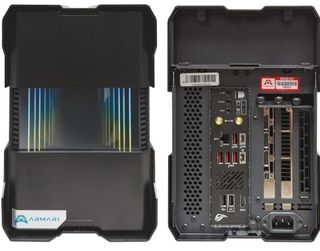Armari
decided
to
provide
us
with
something
a
little
different
for
its
£4,500
workstation
entry
this
year.
Instead
of
the
classic
black
box
like
something
out
of 2001:
A
Space
Odyssey,
the
Magnetar
PrMM16R9
is
small
–
very
small.
Yet
it
packs
in
the
same
workstation-grade
components
found
in
more
conventional
systems.
The
Magnetar
uses
a
Phanteks
Evolv
Shift
XT
chassis,
which
is
a
quarter
to
a
third
smaller
in
every
dimension
than
other
cases
this
month.
The
physical
appearance
with
angled
corners
is
stylish,
but
the
infinity
mirror
on
the
front
is
mesmeric,
looking
like
a
lit
passageway
extending
unfeasibly
into
the
front
of
the
case.
This
is
a
chassis
you’ll
want
to
display
on
your
desk
as
a
statement
rather
than
hiding
it
below.
Yet
it
still
sports
a
240mm
liquid-cooling
system
for
the
CPU
and
an
850W
PSU.
Although
there’s
not
much
room
for
extra
storage
in
a
case
this
small,
the
only
avoidable
downside
is
that
there
are
no
USB
or
audio
ports
on
the
front.
There
was
a
hope
that
this
system
could
be
supplied
with
the
AMD
Ryzen
9
9950X,
but
this
member
of
the
new
9000-series
wasn’t
quite
ready
for
testing
at
the
time
of
writing.
Instead,
Armari
sent
this
system
with
the
previous-generation
7950X,
but
it
will
ship
the
final
version
with
the
9950X
for
the
price
quoted
above.
The
7950X
provides
the
same
16
cores
as
the
9950X,
running
at
a
base
4.5GHz
with
a
5.7GHz
boost,
whereas
the
9950X
will
have
the
same
boost
frequency
but
an
improved
core
design.
Armari
partners
the
Ryzen
9
with
a
hefty
96GB
of
5,600MHz
DDR5
RAM,
supplied
as
two
48GB
modules.
This
takes
up
both
DIMM
slots
on
the
Asus
ROG
Strix
B650E-I
Gaming
WiFi
motherboard,
but
you
probably
won’t
want
more
in
a
small
system
such
as
this
one.
Despite
its
size,
the
PrMM16R9
has
room
for
a
dual-width
graphics
card,
in
this
case
the
AMD
Radeon
Pro
W7800.
It
could,
apparently,
take
an
even
wider
accelerator
such
as
the
triple-width
W7900.
The
W7800
sports
4,800
Stream
Processors
and
32GB
of
GDDR6
memory
delivering
576GB/sec
of
bandwidth.

(Image
credit:
Future)
Another
surprising
inclusion
for
such
a
diminutive
system
are
the
two
storage
drives.
The
main
one
is
a
2TB
Crucial
T705
NVMe
M.2
device,
with
a
PCI
Express
5
interface.
This
delivered
8,413MB/sec
sustained
reading
and
7,792MB/sec
writing
using
CrystalDiskMark
8.
Then
there’s
a
secondary
2TB
Kioxia
Exceria
Pro
NVMe
drive
running
at
PCI
Express
4
speeds
and
providing
7,095MB/sec
reading
alongside
3,218MB/sec
writing
speeds.
Although
the
Magnetar’s
AMD
Ryzen
9
7950X
is
the
previous
CPU
generation
now,
it
packs
a
punch.
An
overall
score
of
729
in
the PC
Pro media
benchmarks
still
beats
the
InterPro’s
Core
i9-14900K
CPU,
with
solid
results
of
289
in
image
editing,
692
in
video
encoding
and
901
in
multitasking.
The
multi-CPU
render
result
with
Maxon
Cinebench
2024
of
1,991
is
also
slightly
faster.
The
Blender
Gooseberry
frame
took
283
seconds,
which
surpassed
all
the
other
systems
in
the
£4,500
class.
Considering
the
performance
of
the
12-core
Ryzen
9000
series
used
by
Scan,
with
the
9950X
in
this
system
instead
of
the
7950X,
the
results
would
be
very
competitive
indeed.
The
AMD
Radeon
Pro
W7800
performs
well.
In
SPECviewperf
2020,
results
of
230
in
3dsmax-07
and
757
in
maya-06
show
excellent
3D
animation
modelling
ability.
And
169
in
catia-06,
238
in
creo-03
and
600
in
snx-04,
with
a
decent
438
in
solidworks-07,
imply
capable
CAD
and
engineering
abilities.
The
AI
inference
score
of
24,623
in
the
Geekbench
ML,
12,617
with
LuxMark
3.1
OpenCL,
and
Blender
Gooseberry
frame
time
of
145
seconds
are
about
what
we’d
expect
from
this
GPU.
With
our
review
sample
relying
on
a
previous-generation
AMD
Ryzen,
the
Armari
Magnetar
PrMM16R9
couldn’t
win
this
Labs
test;
although
the
upgrade
will
be
at
no
extra
cost
by
the
time
you
read
this,
we
can’t
confirm
the
performance
until
we
try
it.
But
this
is
still
a
great-looking
compact
system
that
punches
way
above
its
size.
It
has
plenty
to
commend
it
to
anyone
looking
for
a
stylish
yet
powerful
desk-friendly
workstation.
This
review
first
appeared
in
Issue
361
of
PC
Pro.
